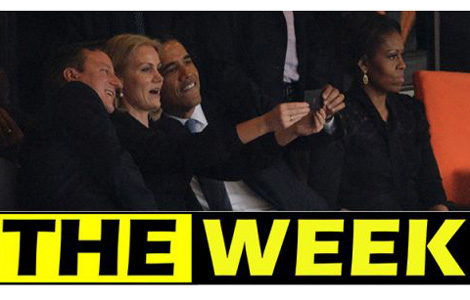More antics from Abe
Updated: 2013-12-16 07:23
(China Daily)
|
|||||||||||
Japanese Prime Minister Shinzo Abe is waging a relentless public opinion offensive against China.
The just concluded ASEAN-Japan Commemorative Summit to commemorate the 40th anniversary of ASEAN-Japan relations provided him with the latest stage for his fearmongering.
Yet the joint statement issued on Saturday shows his attempts to cajole ASEAN nations onto his China-bashing bandwagon were abortive, as it was a commitment to peace and stability in the Asia-Pacific, with Japan promising a "proactive contribution to peace".
We join the ASEAN leaders in looking forward to Japan being faithful to this pledge. Because what we have witnessed from the Abe administration is anything but that.
Abe spared no effort in trying to sell his distorted version of the story about the East China Sea to ASEAN leaders; China's Air Defense Identification Zone, he insisted, is the source of all evil.
But Abe knowingly concealed the truth that it is Japan's "nationalization" of China's Diaoyu Islands that broke the status quo, which China carefully preserved and kept out of sight for decades. And he shows no sign of a guilty conscience when laying the blame on Beijing for "unilaterally changing" this status quo.
Abe stands firm behind such a groundless allegation because otherwise there is no pretext to justify his military ambitions.
Responding to a press inquiry about whether Japan should spend more on economic development than on military expansion, Abe, replied that Japan must ensure "free passage and overflight". However, contrary to Abe's claims, China's ADIZ is not a no-fly zone, and in no way does it harm the basic principles of international law. His call for China to rescind the ADIZ, therefore, is just wishful thinking.
Nor will his appeal for leader-to-leader dialogue get a positive response from Beijing, because he wants Beijing to one-sidedly concede to his terms.
He said he hopes to "return to the starting point of the two countries' relationship of strategic mutual benefits and conduct dialogue".
But that point is inaccessible at present, because it means the two parties acknowledge the existence of a dispute over the islands and share a willingness to shelve their differences in order to forge harmonious ties. Abe's current policy is the opposite of that.
(China Daily 12/16/2013 page8)
Related Stories
China slams Abe's comments on ADIZ 2013-12-15 02:08
Abe, save Japanese economy first 2013-12-04 07:56
US fuels belligerent Abe 2013-11-28 07:22
Abe busy in ASEAN blitz aimed at Beijing 2013-11-18 06:58
Blame Abe for worsening trade 2013-10-30 06:58
Today's Top News
Complacency hinders US energy-saving strategies
Beijing to reform pricing system for subway tickets
Vaccines suspended after deaths
China reports new H7N9 case
Chang'e-3 mission 'complete success'
Mandela laid to rest
Abe's checkbook diplomacy may fail
Finding people with right talent
Hot Topics
Lunar probe , China growth forecasts, Emission rules get tougher, China seen through 'colored lens', International board,
Editor's Picks

|

|

|

|

|

|




